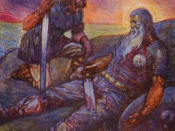It has once been said, "Good is all that serves life, and evil is all that serves death. Good is reverence for life...and all that enhances life. Evil is all that stifles life, narrows it down, and cuts it to pieces" (Emily Coombs). This statement is true in every piece of writing or shows where there is a dispute among good and evil. Good versus evil is a theme that is very eye catching for a reader and it is the most common theme in literature. Wherever there is good, one will always find evil because without evil the good cannot be classified as good. And a similar trend to the argument with good versus evil is the fact that good always conquers evil. In Beowulf, the clash between good and evil is portrayed through Grendel, Grendel's mother, the Dragon, and Beowulf; moreover, in the end, we come to realize that good is always virtuous of evil.
Upon hearing the misfortune of the Danes, Beowulf, a man with a history of bravery, comes for the rescue of the Danes from the hands of the evil Grendel. Beowulf portrays the image of a very strong and confident warrior who fights without weapons and has no fear. The only weapon Beowulf carries is his faith in God. On the night of the feast Beowulf hears about the monstrous Grendel and where he lives: "Not hell but hell on earth. He was spawned in that slime/Of Cain, murderous creatures banished/ By God, punished forever for the crime/ Of Abel's death" (Burton Raffel, lines 101-108). Beowulf shows no fear for Grendel; therefore, giving Hrothgar and the Danes hope that their misery will end. Beowulf assures the Danes that he will win the battle with Grendel, he states: "When we crossed the sea,



Interesting
Pretty good essay, the conclusion is persuasive.
2 out of 2 people found this comment useful.